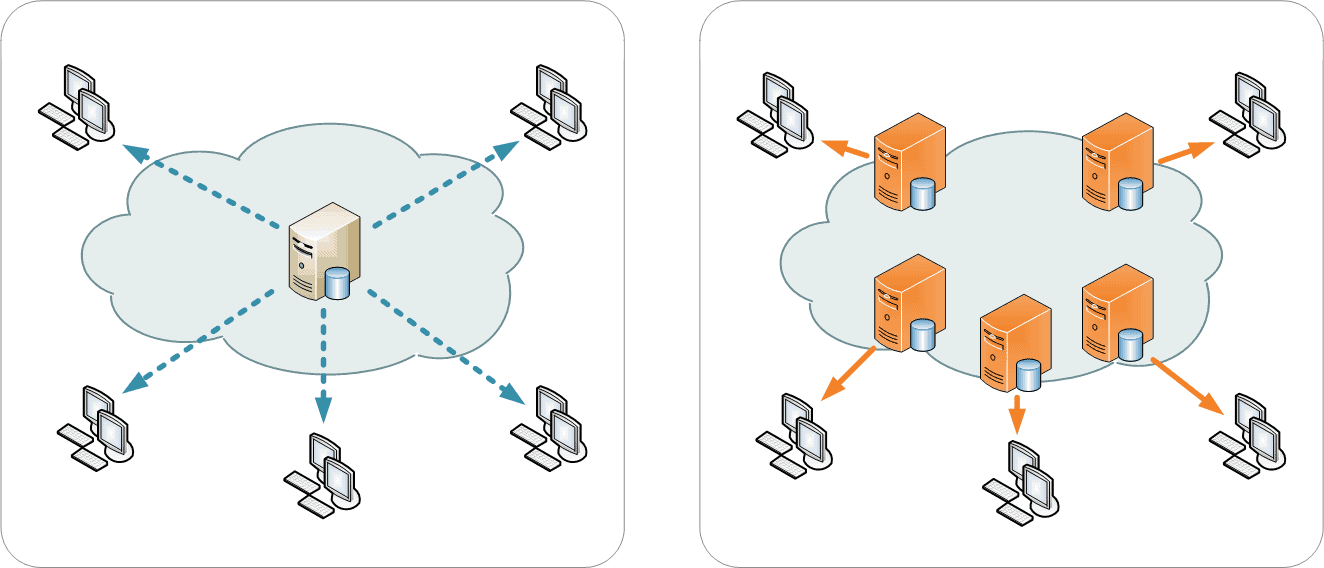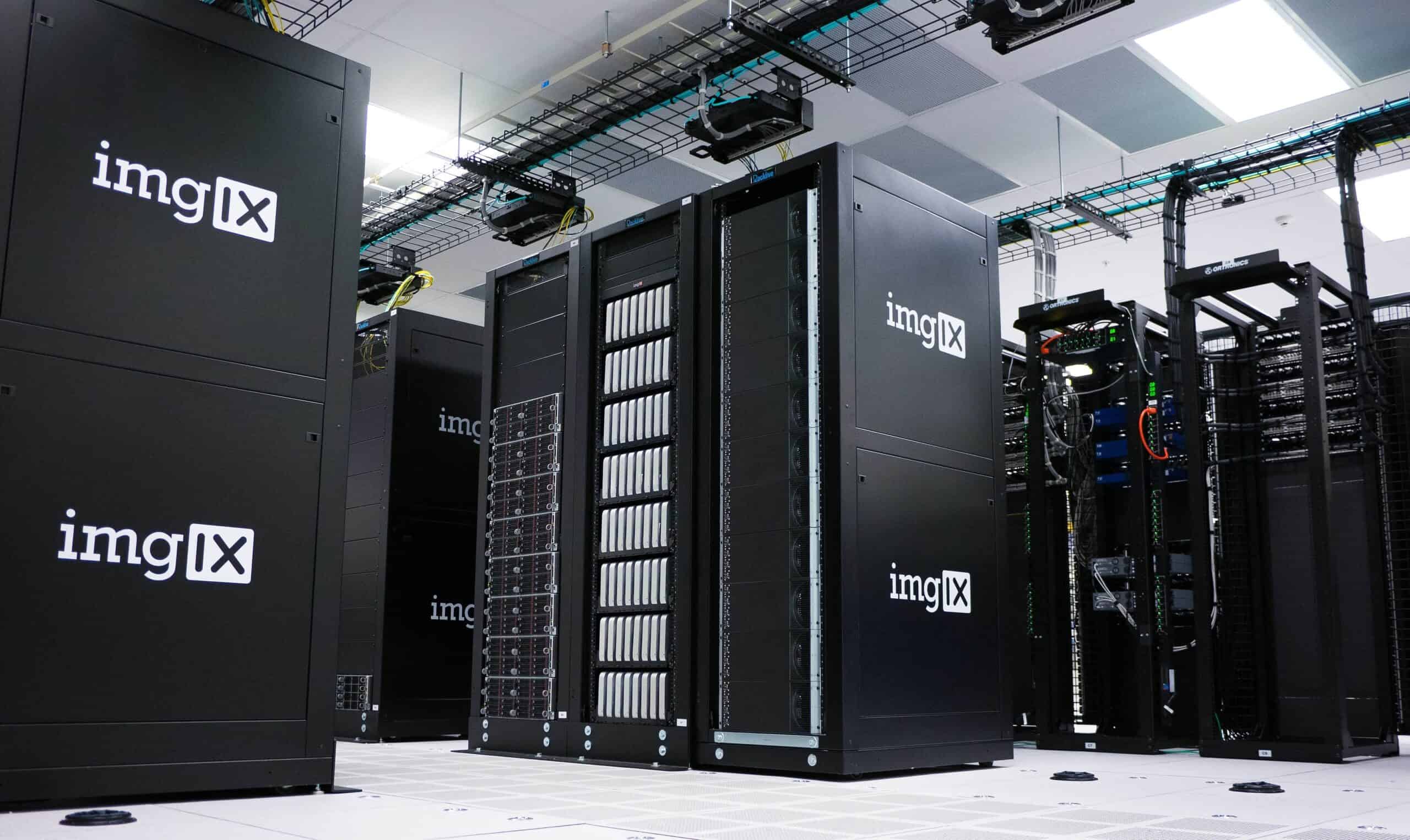Nobody likes to waste time, so the convenience of saving time is incredibly valuable, especially when you’re trying to make a sale. For example, if you were looking to order a pizza from a chain like Dominos you would take the time required to pick it up into account when choosing your store location. The result is the same – you will have a pizza – but the time it takes and the convenience of the experience will vary, especially if the stores are in different states or even countries!
This is a problem that websites with clients all over the world face regularly. Many websites are hosted on a single server, which is likely at one of your web hosting company’s data centers. Depending on the hosting you pay for (dedicated servers or shared hosting), your website uses the power the server offers to deliver content to your visitors. This happens when they visit your site’s URL which causes the browser to send a request to the server for the website’s content. Then, the information is relayed back to the browser and displayed on the screen. The time it takes for the request to process as well as the response to be returned is referred to as latency, and this measurement ultimately effects how fast your site is.
Here’s where the problem comes in. Data transfers happen incredibly quickly, but they are not instantaneous. Just as your Wi-Fi speed improves as you get closer to the router, distance plays a role in how quickly the data transmission occurs. If your website is hosted by GoDaddy in their Phoenix data center and a visitor from Shanghai tries to access your website, the information must be transmitted an incredible distance to their internet service provider’s server (likely through multiple servers on the way) before it reaches the user. To improve the efficiency of the transfer, you have two options: increase the transmission speed or shorten the distance it needs to travel. Because we don’t have the technology for faster transmission currently, bringing the server closer to the customer is the best option. This is where a content delivery network or CDN can help.
So, what is a CDN and why do you need one? Keep reading to discover how you can increase your website’s international outreach, improve performance, and more with a single solution.
What is a CDN?
A CDN is a system of servers that are positioned to allow them to effectively relay information from your website to the visitor’s computer. This is accomplished by storing cached or saved copies of your website’s content on servers in the network that are scattered around the globe. These servers are referred to as “PoPs”, or points of presence and are responsible for the decrease in latency for users.
When someone visits your site, the network will determine the location of the visitor and will use the closest server to respond to the browser’s request. To ensure that the cached content is accurate and up-to-date, the servers will also communicate with the primary server regularly. This makes the process autonomous and invisible to the user while increasing the speed of your website.

Why Do I Need a CDN?
To sum it up in one word: speed.
Speed plays a huge factor in several aspects of your site, including your search engine ranking, conversion rates, customer experience, and more. By using a CDN, you are shortening the time it takes for your website to load for customers, website crawlers, and more that offer several benefits you may not consider offhand.
You need a CDN because it:
Improves Your SEO Ranking: SEO or Search-Engine-Optimization is the process of making your site comply with different search engines’ guidelines, with Google being the primary focus. Google announced that as of 2010, website and page load speeds would play a large part in how your website ranks on the search engine. The increased speeds allow for Google to crawl your site more easily, more often, and apply the maximum benefits to your “ranking rating” for various keywords. A faster website also offers a greater customer experience, which also influenced Google’s decision to weigh site speed favorably.
Improves Customer Experience: As mentioned previously, nobody likes waiting around for a website to load. Much of the internet is near-instant and many users have short attention spans when it comes to navigating sites, so any time a customer is left waiting for a page to load is an opportunity for a missed conversion. By taking advantage of a local server in the CDN to handle their requests, you are ensuring they will not get distracted, frustrated, or leave the site entirely due to unresponsiveness.
Improves Website Reliability & Reduces Server Load: If your website is not accessible, you can’t convert visitors into customers! In some cases, especially when your site experiences high traffic or a spam attack, your primary hosting server can become overwhelmed which can stop the requests from being answered by the server effectively. This will give your user an error message or long load time that gives them the wrong idea about your website and increases the chances of them leaving and not returning.
Using a CDN works to distribute the traffic experienced over multiple PoPs (servers), taking the load off your primary server and helping to stop it from overloading. Additionally, if a PoP becomes overwhelmed or is unresponsive, the CDN can then direct the traffic to the next closest server to ensure the visitor still receives the fastest connection possible.
As you can tell, there are numerous benefits offered by a CDN that can contribute to the overall quality of your website and user experience, an impact that should not be overlooked. However, a CDN is not for everyone and aspects such as your budget, client base, and more should be considered before making the investment.
When to Use a CDN
Although increased speed is always positive for your website, the effectiveness of a CDN is largely dependent on your business. After all, businesses that experience little web traffic or have minimalistic websites that do not feature much multimedia will not see the same effect as a multi-national corporation’s vendor website!
Perhaps the biggest obstacle of using a CDN is the cost of setup, maintenance, and usage fees. Although there are some free CDN services available, they are often under heavy server load and may not perform effectively enough to be beneficial. They can also lack the security protocol of private services, leaving the data that is being transferred vulnerable to attacks.
Many private CDN companies charge a fee for data that is processed on their servers in addition to the initial setup costs. This can get expensive, and because you still need to pay for your own primary hosting (ideally on a dedicated server), the monthly expenses can add up for smaller businesses. There are some cost-effective options out there.
It is also important to consider your clientele before deciding on if you should use a CDN. If you are a U.S. based business that primarily operates locally, the likelihood of you receiving visitors from out of your country are incredibly small, and when dealing with the continental U.S. you are not likely to see an overwhelming difference in performance for the cost of a CDN. However, if you are an eCommerce business that operates internationally or cross-country, you are likely to have visitors from various locations around the world and the effectiveness of a CDN would be much more noticeable.
Your business is not the only deciding factor when it comes to deciding if you should use a CDN, as a CDN is not without its possible technical shortcomings. In some cases, issues can arise with the server that is delivering the content to your visitor, displaying them an older version of your site or your site with broken elements. While it would be delivered more slowly, content from your primary server has a higher chance of being up-to-date and complete. Additionally, the location of the servers can drastically affect how useful they are. If there are no PoP locations in a specific user’s country and they must access a server far away, they can experience longer load times than if their request reached your dedicated server itself while still putting them at risk of receiving an incomplete website.
Ultimately, when to use a CDN comes down to weighing the cost and possible technical difficulties against the benefits the speed increase offers. If you suspect that you will see a sizable amount of international traffic and can afford the fees associated with a CDN, it can help to drastically decrease the latency experienced by your customers, helping to keep them happy and on your site. However, many local businesses with smaller customer bases will see a negligible improvement for the cost of implementing a CDN. If you decide to implement a CDN, be sure to use a private service to ensure your data’s security and site’s reliability are maintained!
If you’ve ever asked yourself “Why do I need a CDN?”, you are not alone. Many believe that their websites are isolated to just their web hosting service and are unaware that allows a CDN can allow them to reach international visitors better, manage the server load of their primary server, and improve their SEO & customer experience. Speed is one of the most important aspects of any site, and there is no better way to improve your website speed for global visitors and extend your website’s lifespan than with a CDN.

